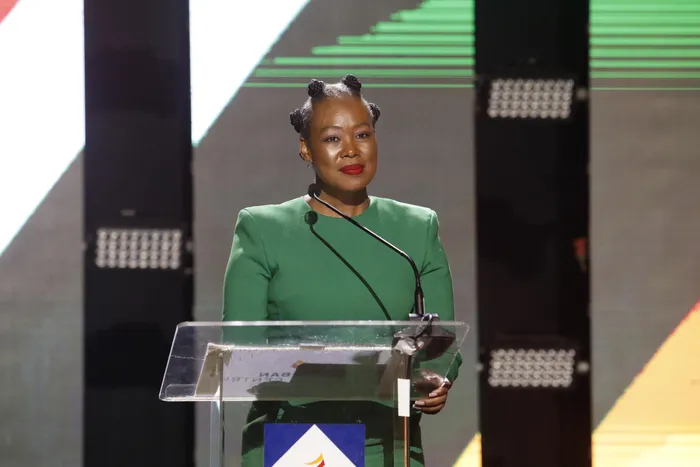Government a step closer to finalising policy to revitalise townships and rural economies
POLICY

Minister of Small Business Development Stella Ndabeni-Abrahams saying that the Government would be focusing on growing local businesses
Image: Doctor Ngcobo/Independent Newspapers
Minister of Small Business Development Stella Ndabeni-Abrahams has revealed that her department was finalising the long-overdue Township and Rural Economic Development and Revitalization Policy to support township enterprise hubs, zones, and clusters.
In 2023, the government commissioned a study on mapping and identification of opportunities in 20 townships focusing on local production and import substitution, infrastructure support, and investment in industrial parks.
The study also looked into various aspects such as the economic linkages with other townships and the broader economy, extent of industrialisation, critical challenges affecting economic development, funding and financial instruments.
South Africa’s townships still experience poor investment, overpopulation, poor infrastructure, high levels of unemployment, deepening poverty and isolation from mainstream economic centres.
Speaking at the 60th anniversary celebration of the National African Federated Chamber of Commerce and Industry (Nafcoc) on Friday, Ndabeni-Abrahams said they will consult Nafcoc leadership before the department submits the policy to Cabinet for approval.
"This policy outlines clear proposals to create business hubs in our townships and rural areas, to turn these historically dormitory spaces into vibrant economies in which MSMEs can grow and thrive," she said.
"To catalyse these business hubs, we will over the next 5 years, develop 52 shared economic infrastructure facilities in partnership with other state agencies and the private sector to provide safe spaces to trade and produce."
Ndabeni-Abrahams also committed the government to focusing on growing local businesses, saying the role of black business owners and their contribution in the struggle against apartheid is often discounted and at best underrated.
She said that micro, small, and medium enterprises (MSMEs) sector continued "to sustain households, contribute to local economies, and reflect the country’s entrepreneurial spirit".
"Supporting the growth of black business is an issue that is very dear to President Cyril Ramaphosa’s heart. We also know from Statistics South Africa that MSMEs contribute two-thirds of jobs in South Africa. And we know that Black Africans make up 75% of all MSME business owners," she said.
"We cite these figures to illustrate the progress that has been made with economic transformation since democracy at a time when B-BBEE - and indeed, the very notion of economic empowerment for our country’s majority are under siege."
Nafcoc President Gilbert Mosena made a call for the government to work with the private sector, saying that South Africa cannot build a prosperous nation on the foundations of inequality.
"The blueprint for a new South Africa, as envisioned by your government, must focus on creating an economy where all South Africans, regardless of their race or background, will have an equal opportunity to succeed," Mosena said.
"The exclusion of black South Africans from economic opportunities is a legacy that continues to shape the lives of millions today. While we have made strides in the political realm, economic justice remains elusive for many."
Mosena pointed to lack of access to capital as one of the most significant barriers to black economic empowerment and small businesses survival.
"The financial system continues to reflect the inequities of the past, with black entrepreneurs still finding it difficult to secure financing," he said.
"We call for the establishment of state-backed development banks that will prioritise funding for black-owned small and medium enterprises (SMEs), particularly in critical sectors like manufacturing, agro-processing, mining, transportation, leisure and tourism, and technological innovations."
KZN Premier Thami Ntuli committed the Government of Provincial Unity to driving economic growth, address poverty, and create employment opportunities.
"We invite the business community, particularly Nafcoc, to partner with us in driving economic growth and development," Ntuli said.
"We recognise that we cannot achieve our objectives without your active participation and support. Together, we can address the bottlenecks that hinder our progress and create opportunities for investment and growth."
BUSINESS REPORT